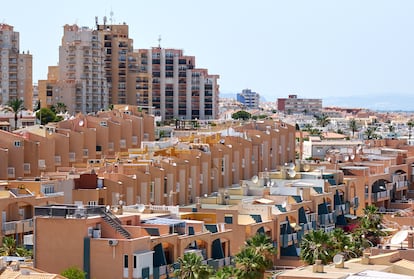In Spain, old Franco law hampers post-Brexit house sales to Britons
A 1975 measure that still endures will now affect UK property buyers as non-EU residents in Spain, according to estate agents in the south of Alicante province

A Kafkian cocktail of red tape stemming from the effects of Brexit combined with legislation drafted by the Spanish dictator Franco in 1975 will now delay the sale of homes to around 800 Britons a year in the Vega Baja area of Alicante province, a popular destination on the Mediterranean.
This piece of legislation is still in force and requires non-EU buyers of properties within range of strategic defense points to obtain a special permit from the Defense Ministry. The process takes months and urban areas with large UK communities such as Torrevieja, Orihuela Costa, San Miguel de Salinas and Pilar de la Horadada are all affected, being within the vicinity of the Cartagena naval base, located about 60 kilometers away.
In total, the law impacts about 1,560 municipalities across Spain as it also applies to urban areas close to the Strait of Gibraltar, the Bay of Cádiz, the Galician coast and Spain’s borders with France and Portugal. But the south of Alicante will be particularly affected as, according to Jesualdo Ros, secretary general of the Association of Real Estate Developers of the Province of Alicante (Provia), it accounts for the highest percentage of predominantly British foreign buyers. “Eighty percent of foreign purchases are made by British citizens in that area,” says Ros. This means around 800 buyers a year will be affected.
It not only generates huge frustration for both the seller and the buyer, it also affects Spain’s image as a country that welcomes residentsJesualdo Ros, secretary general of Provia
The legislation states that future residents must apply for the Defense Ministry’s permit alongside documentation that includes a sworn translation of a criminal record certificate from their country, two photographs and a certified photocopy of their passport. The law was proposed within the context of the Cold War when Spain had not yet joined either the European Union or the defense alliance NATO, “and they didn’t have technologies like the internet,” noted Ros. The application goes through the Captaincy General of Barcelona and processing has, until now, taken between four to six months. However, it could now take longer as the usual 150 annual requests for the province of Alicante from non-EU citizens are about to multiply and, in Ros’ opinion, could extend the process to anything up to a year.
Ros stresses that this delay will affect all the aspects of a real estate sale. “A notary cannot issue the deed of a property to a foreigner without this documentation,” he says. “Nor can a loan be requested since the banks do not know what the interest rate will be when the process is completed. Even the value of the property cannot be appraised. It is absurd. It not only generates huge frustration for both the seller and the buyer, it also affects Spain’s image as a country that welcomes residents.”
The antiquated law has been a matter of concern to developers for years. “In 2012, we drew up a thorough report that was presented to various central administrations, as well as to the regional government,” says Ros. In it, alternatives such as a silence-is-consent system (silencio positivo) or a signed statement of responsibility (declaración responsable) are proposed as a way to compensate for the obligatory nature of a pre-democratic law and to simplify the process. Ros also points out that there are more efficient ways of obtaining the required data – ways that would mean accessing even more useful information, such as regulations on money laundering that financial entities and notaries have to comply with.
English version by Heather Galloway.
Tu suscripción se está usando en otro dispositivo
¿Quieres añadir otro usuario a tu suscripción?
Si continúas leyendo en este dispositivo, no se podrá leer en el otro.
FlechaTu suscripción se está usando en otro dispositivo y solo puedes acceder a EL PAÍS desde un dispositivo a la vez.
Si quieres compartir tu cuenta, cambia tu suscripción a la modalidad Premium, así podrás añadir otro usuario. Cada uno accederá con su propia cuenta de email, lo que os permitirá personalizar vuestra experiencia en EL PAÍS.
¿Tienes una suscripción de empresa? Accede aquí para contratar más cuentas.
En el caso de no saber quién está usando tu cuenta, te recomendamos cambiar tu contraseña aquí.
Si decides continuar compartiendo tu cuenta, este mensaje se mostrará en tu dispositivo y en el de la otra persona que está usando tu cuenta de forma indefinida, afectando a tu experiencia de lectura. Puedes consultar aquí los términos y condiciones de la suscripción digital.









































